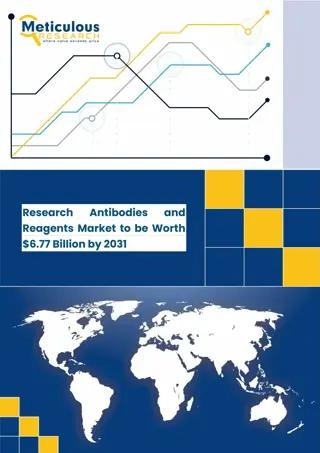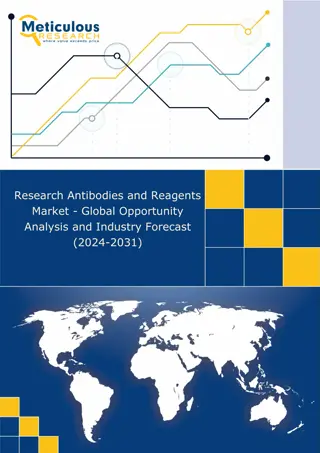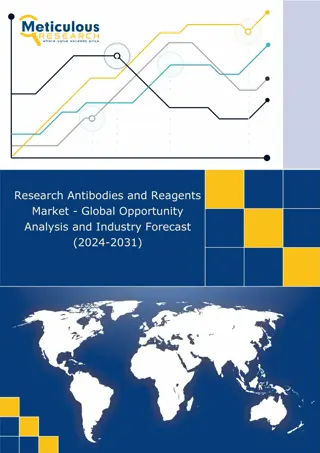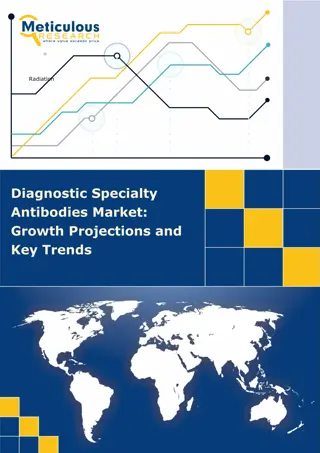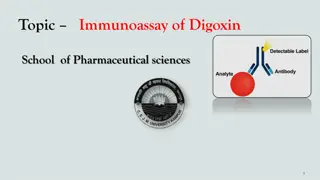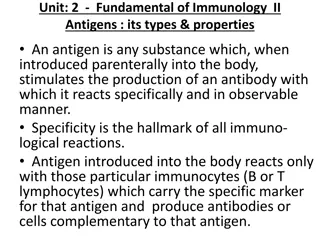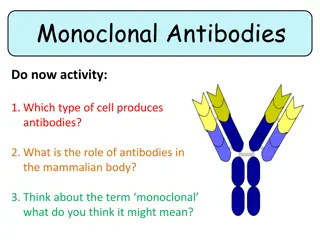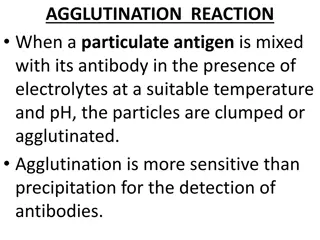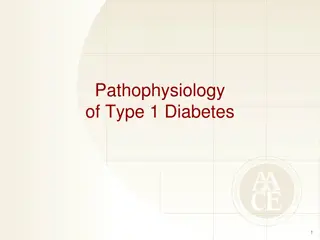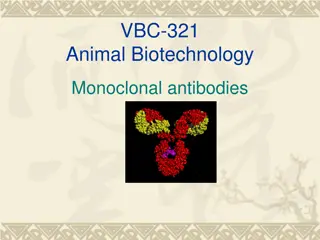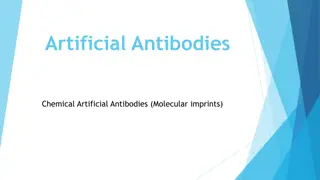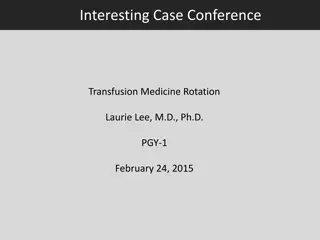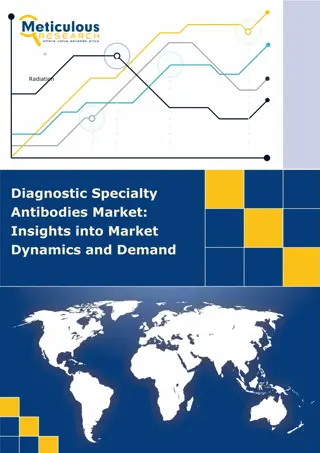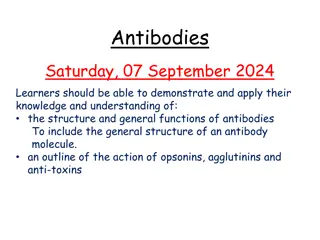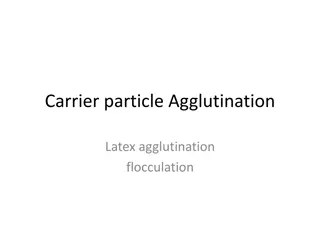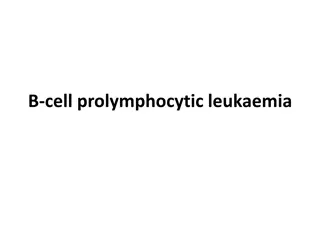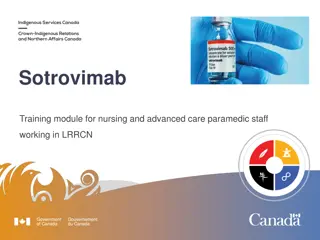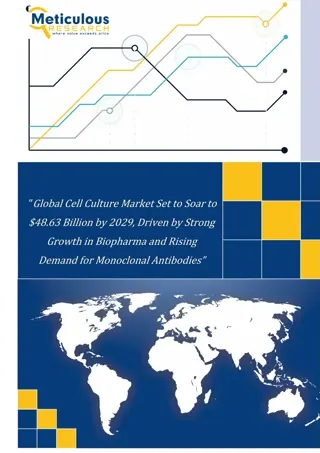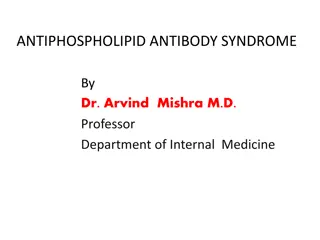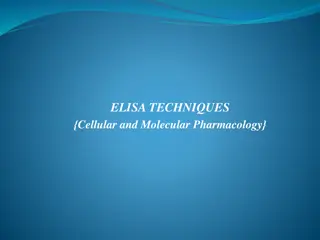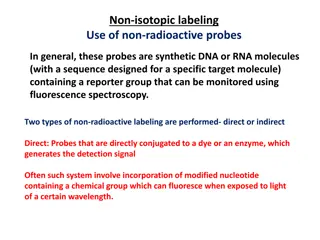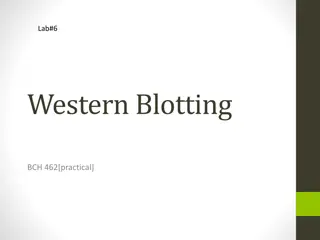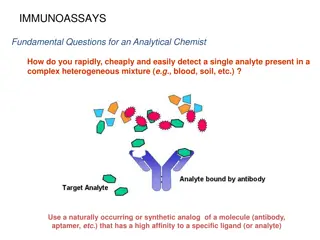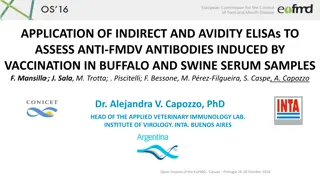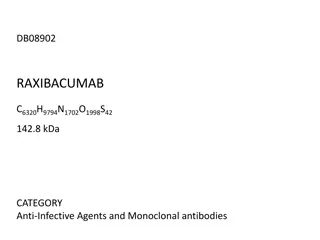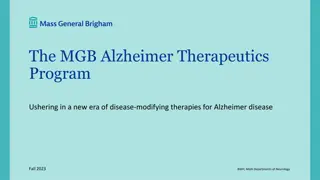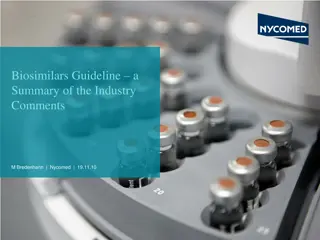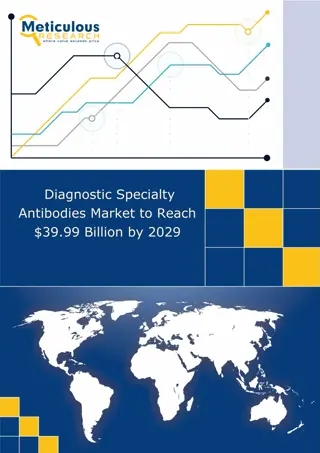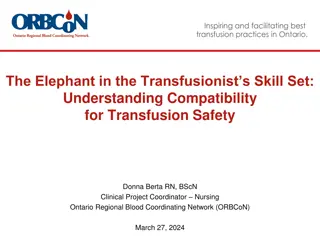Cell Culture Reagents Market Application, Size, Demand and Growth
The growth of this market is driven by factors such as the rising demand for monoclonal bodies, the increasing prevalence of chronic diseases, funding for cell-based research, and an increase in R&D spending in the life science sector. Furthermore, the growing adoption of 3D cell culture, the growth
0 views • 3 slides
Research Antibodies and Reagents Market to be Worth $6.77 Billion by 2031
Research Antibodies and Reagents Market by Product (Antibodies {Type [Primary, Secondary]} {Production [mAb, pAb]} {Source [Mouse, Rabbit]} Research Area} Media, Stains, Enzyme) Technology (ELISA, Flow Cytometry), Application\u2014Global Forecast to 2031
2 views • 4 slides
Understanding RSV and its Global Impact
RSV, or respiratory syncytial virus, is a significant global health concern causing severe respiratory infections, particularly affecting young children. It leads to pediatric hospitalizations and mortality, with a high burden in low- and middle-income countries. Prevention strategies, such as long-
7 views • 23 slides
Research Antibodies and Reagents Market - Global Opportunity Analysis and Industry Forecast (2024-2031)
Meticulous Research\u00ae\u2014a leading global market research company, published a research \nreport titled, \u2018Research Antibodies and Reagents Market by Product (Antibodies {Type \n[Primary, Secondary]} {Production [mAb, pAb]} {Source [Mouse, Rabbit]} Research Area} \nMedia, Stains, Enzyme) T
3 views • 4 slides
Research Antibodies and Reagents Market - Global Opportunity Analysis and Industry Forecast (2024-2031)
Meticulous Research\u00ae\u2014a leading global market research company, published a research report titled, \u2018Research Antibodies and Reagents Market\u2019 by Product (Antibodies {Type [Primary, Secondary]} {Production [mAb, pAb]} {Source [Mouse, Rabbit]} Research Area} Media, Stains, Enzyme) T
5 views • 4 slides
continous bioprocessing market
\nContinuous Bioprocessing Market by Product (Filtration, Chromatography, Bioreactor, Incubator, Centrifuge, Reagents) Process (Upstream, Downstream) Application (Monoclonal Antibodies, Vaccines, Plasma Fractionation, R&D) End User - Global Forecast to 2031
1 views • 3 slides
The Role of Gemtuzumab 4.5 mg in Precision Oncology
\n\nGemtuzumab 4.5 mg is a monoclonal antibody that targets CD33 antigen, which is found on the surface of leukemia cells. In precision oncology, this drug has been used to treat patients with acute myeloid leukemia (AML) who are deemed appropriate for this therapy. It has been shown to increase sur
1 views • 3 slides
Diagnostic Specialty Antibodies Market is expected to grow at a CAGR of 4.6% fro
Diagnostic Specialty Antibodies Market by Type (Primary, Secondary), Clonality (Monoclonal, Polyclonal), Technique (WB, Rapid Test, IHC, IP), Conjugate, and Application (Dengue, Malaria, Hepatitis, HIV, E. coli , Tuberculosis, Pneumonia, Cancer)- For
0 views • 6 slides
Antibodies in Vaccines: Risks and Case Studies
Explore the impact of antibodies in vaccines and their link to autoimmune diseases through case studies. Uncover the safety signals related to various antibodies and their potential risks in COVID vaccine recipients. Discover how antibodies like Beta-2 Glycoprotein, Antiplatelet, and DNA can lead to
0 views • 9 slides
Understanding Immunoassay of Digoxin in Pharmaceutical Sciences
Immunoassay is an analytical method utilizing specific antibody-antigen reactions to determine reactant amounts. This method involves competitive binding between labeled and unlabeled analytes and specific antibodies. Antibodies, antigens, labels, and separation matrices play crucial roles in immuno
0 views • 29 slides
Understanding Antigens and Immunogens: Types and Properties
Antigens are substances that stimulate the production of antibodies in the body, exhibiting specificity in immune reactions. They interact with immune response products like antibodies, BCRs, and TCRs. Immunogens induce detectable immune responses, leading to antibody production or T cell activation
1 views • 30 slides
Understanding Monoclonal Antibodies in Medical Treatment
Monoclonal antibodies are created using hybridoma cells that can produce specific antibodies and divide rapidly. These antibodies, which target specific antigens, have various applications in medicine, such as in cancer treatment and pregnancy tests. By harnessing the immune system's abilities, mono
1 views • 19 slides
Understanding Agglutination Reactions in Immunology
Agglutination reaction is a key technique in immunology where particulate antigens and antibodies clump together in the presence of electrolytes. This reaction is highly sensitive and often used for antibody detection, bacterial identification, blood grouping, and cross-matching. The process involve
0 views • 20 slides
Understanding Type 1 Diabetes Pathophysiology and Etiology
Type 1 diabetes is characterized by absolute insulin deficiency, resulting from pancreatic beta cell destruction. It is prone to ketosis with a total deficit of circulating insulin, often due to autoimmune factors. The pathophysiology involves inflammation, immune-mediated cell destruction, and a ch
0 views • 13 slides
Unlocking the Clinical Significance of Alloimmunization in Transfusion Medicine
Alloimmunization, a critical side effect of transfusion, has been a challenge in matching phenotypes and genotypes globally. The detection of clinically significant antibodies requires a delicate balance between sensitivity and specificity, considering various controllable and uncontrollable variabl
0 views • 20 slides
Understanding Monoclonal Antibodies in Animal Biotechnology
Monoclonal antibodies (mAb) play a crucial role in identifying and neutralizing foreign substances in the body. This article delves into the significance of monoclonal antibodies, their structure, development history, and the revolutionary hybridoma technology. Explore the world of antibodies and th
0 views • 12 slides
Understanding Donor-Specific Antibodies in Kidney Transplantation
Antibodies against antigens in the major histocompatibility complex play a crucial role in kidney transplant rejection. Different types of donor-specific antibodies can lead to rejection at various stages post-transplantation. Methods to discover donor-specific anti-HLA antibodies include complement
0 views • 16 slides
Understanding Molecular Imprinting in Artificial Antibodies
Molecular imprinting is a technique used to create synthetic antibodies with specific recognition sites, allowing for applications in chiral chromatography, immunoassays, sensor development, and more. Imprinted polymers offer advantages such as target-defined recognition sites and stability in vario
0 views • 15 slides
Interesting Case Conference - Transfusion Medicine Rotation Laurie Lee, M.D., Ph.D.
One-day-old male infant admitted to the NICU for prematurity and respiratory distress, with a complex maternal history including multiple antibodies. Blood bank tests revealed a positive DAT, and molecular testing identified the patient as positive for JK*A and JK*B alleles. Interpretation suggests
0 views • 18 slides
Diagnostic Specialty Antibodies Market, Diagnostic Antibody, Infectious Disease
Diagnostic Specialty Antibodies Market by Type (Primary, Secondary), Clonality (Monoclonal, Polyclonal), Technique (WB, Rapid Test, IHC, IP), Conjugate, and Application (Dengue, Malaria, Hepatitis, HIV, E. coli , Tuberculosis, Pneumonia, Cancer)- For
0 views • 3 slides
Diagnostic Specialty Antibodies Market: Opportunities in Developing Regions
Diagnostic Specialty Antibodies Market by Type (Primary, Secondary), Clonality (Monoclonal, Polyclonal), Technique (WB, Rapid Test, IHC, IP), Conjugate, and Application (Dengue, Malaria, Hepatitis, HIV, E. coli , Tuberculosis, Pneumonia, Cancer)- For
0 views • 3 slides
Understanding Antibodies: Structure, Functions, and Applications
Explore the structure and functions of antibodies, including how they bind to antigens, act as opsonins, agglutinins, and anti-toxins. Learn about the specificity of antibodies, their variable regions, and their role in neutralizing pathogens and viruses. Gain insights into how antibodies help the i
1 views • 17 slides
Agglutination Testing in Laboratory Medicine
Agglutination testing is a common method used in laboratory medicine to detect the presence and amount of antigens or antibodies in patient samples. It involves the use of carrier particles such as latex, RBCs, charcoal, and protein A of Staph aureus. The testing process includes qualitative and qua
0 views • 18 slides
Understanding B-Cell Prolymphocytic Leukaemia and CLL-Related Conditions
B-cell prolymphocytic leukaemia (B-PLL) is a rare disorder that mainly affects older patients, presenting with splenomegaly and high white blood cell counts. CLL-related conditions like Monoclonal B-cell lymphocytosis and Richter's syndrome can further complicate the prognosis, especially in elderly
0 views • 23 slides
Sotrovimab Training Module for Healthcare Professionals
The Sotrovimab training module is designed for nursing and advanced care paramedic staff working in certain healthcare settings. It covers the uses, indications, administration procedure, eligibility criteria, and follow-up care for Sotrovimab, an antiviral monoclonal antibody developed for mild to
0 views • 26 slides
Global Cell Culture Market Set to Soar to $48.63 Billion by 2029, Driven by Strong Growth in Biopharma and Rising Demand for Monoclonal Antibodies
Cell Culture Market by Product [Consumables (Media, Reagents, Sera, Cell Lines), Equipment (Bioreactor, Centrifuge, Cell Counter)], Application (Bioproduction, Cancer Research, Stem Cell, Diagnostic), End User (Pharma, academic) - Global Forecast to
0 views • 5 slides
Understanding Antiphospholipid Antibody Syndrome and Its Clinical Implications
Antiphospholipid antibody syndrome is an acquired disorder characterized by recurrent thrombosis or pregnancy complications due to autoantibodies against phospholipid-binding plasma proteins. Learn about its classification, epidemiology, pathogenesis, and diagnostic antibodies. Discover how lupus an
0 views • 35 slides
Understanding ELISA Techniques in Cellular and Molecular Pharmacology
ELISA (Enzyme-Linked Immunosorbent Assay) is a vital immunological technique used in detecting antigens or antibodies in samples. This article covers the types of ELISA tests, such as Direct, Indirect, and Sandwich, along with the principles and applications of ELISA in diagnosis. The process involv
0 views • 18 slides
Non-Isotopic Labeling for Molecular Detection
The use of non-radioactive probes in molecular detection involves synthetic DNA or RNA molecules with specific target sequences and reporter groups detectable via fluorescence spectroscopy. Direct and indirect labeling methods utilize fluorescent dyes or enzymes conjugated to modified nucleotides, a
0 views • 20 slides
Understanding Western Blotting for Protein Detection in Biochemistry
Western blotting, also known as protein immunoblot, is a crucial technique for identifying specific proteins based on their ability to bind to antibodies. It involves electrophoresis of protein samples on an SDS-PAGE gel, transferring them to a nitrocellulose membrane, and detecting them using speci
0 views • 17 slides
Understanding ELISA: Principle, Types, and Applications
ELISA (enzyme-linked immunosorbent assay) is a widely used laboratory technique for detecting and quantifying antigens or antibodies in blood samples. Introduced in 1971, ELISA involves an antigen-antibody reaction using enzyme-conjugated antibodies to generate a colored product on a plate. There ar
1 views • 14 slides
Understanding Immunoassays and Antibodies in Analytical Chemistry
Immunoassays are analytical techniques utilizing antibodies to selectively determine components in samples. Antibodies, crucial in the immune system, bind antigens through specific interactions. The binding affinity is high, making immunoassays valuable for diverse applications like drug testing and
0 views • 25 slides
Understanding Eligibility for Novel CGRP Monoclonal Antibodies in Migraine Patients
Characteristics of individuals eligible for novel CGRP monoclonal antibodies in migraine treatment were studied, revealing insights on access to preventive treatments for migraine patients. The American Headache Society highlights the importance of empirical research to enhance access to preventativ
0 views • 8 slides
Diagnostic Approaches in Hematologic Disorders: A Comprehensive Overview
Explore the diagnostic considerations for multiple myeloma, monoclonal gammopathy of undetermined significance (MGUS), and related conditions, including indications for serum protein electrophoresis (SPEP) and free light chain (FLC) testing. Learn when not to order SPEP and FLC, and consider various
0 views • 24 slides
Application of Indirect and Avidity ELISAs for Anti-FMDV Antibody Assessment in Buffalo and Swine Serum Samples
In this study, researchers utilized indirect and avidity ELISAs to evaluate anti-foot-and-mouth disease virus (FMDV) antibodies induced by vaccination in serum samples from buffalo and swine in Argentina. The country is FMD-free, with vaccines applied to cattle and buffaloes but not to pigs. The res
0 views • 23 slides
Raxibacumab: Monoclonal Antibody for Inhalational Anthrax
Raxibacumab is a human IgG1 monoclonal antibody designed to treat and prevent inhalational anthrax caused by Bacillus anthracis. It targets the protective antigen component of the anthrax toxin, inhibiting its binding to cellular receptors and preventing toxin entry. Administered via IV infusion, Ra
0 views • 6 slides
Advancements in Alzheimer Disease Therapeutics Program
The MGB Alzheimer Therapeutics Program is a collaborative effort leading to groundbreaking disease-modifying therapies for Alzheimer's disease. The development of Lecanemab (Leqembi), a monoclonal antibody targeting amyloid plaques, offers a new option to slow disease progression. The program's focu
0 views • 21 slides
Understanding Biosimilars: Summary and Discussion
Biosimilars are biological medicines similar but not identical to reference products. They are complex mixtures with specific properties, impacting patient safety. The production process determines the characteristics of biosimilars, with monoclonal antibodies being especially complex. Explore the s
0 views • 29 slides
Diagnostic Specialty Antibodies Market Poised to Hit $39.99 Billion by 2029
Meticulous Research\u00ae\u2014a leading global market research company published a research report titled \u201cDiagnostic Specialty Antibodies Market by Type (Primary, Secondary), Clonality (Monoclonal, Polyclonal), Technique (WB, Rapid Test, IHC,
0 views • 3 slides
Understanding Blood Compatibility for Safe Transfusions
This presentation delves into the critical topic of blood compatibility for safe transfusions, covering aspects such as ABO and Rh blood groups, clinically significant antibodies, and potential incompatibilities. The session aims to enhance understanding of antigens, antibodies, and the risks of mis
0 views • 44 slides

